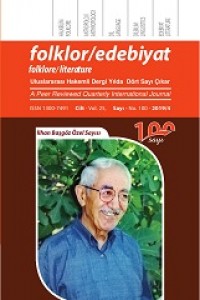Abstract
References
- Bascom, W. R. (2010). Folklorun dört işlevi. (F. Çalış, Çev.), Halkbiliminde kuramlar ve yaklaşımlar 2. ( M. Ö. Oğuz ve S. Gürçayır, Ed. ). (ss.71-86). Ankara: Geleneksel.
- Bulut, M. Ö. (2011). Kalabalıklar ve beden müziği. (Yayımlanmamış sanatta yeterlilik tezi). Eskişehir Anadolu Üniversitesi Güzel Sanatlar Enstitüsü. Üflemeli ve Vurmalı Çalgılar Bölümü, Eskişehir.
- Çobanoğlu, Ö. (2002). Halkbilimi kuramları ve araştırma yöntemleri tarihine giriş. Ankara: Akçağ.
- Hanna, J. L. (1979). To dance is human, Austin: University of Texas.
- Huizinga, J. (1980). Homo ludens, A study of the play-element in culture, Routledge and Kegan Paul, London: Boston and Henley.
- İşler, E. ve Özay İ. (2008). Türkçe-Arapça kapsamlı sözlük. Ankara: Fecr.
- Köprülü, M. F. (1999). Edebiyat araştırmaları. Ankara: Türk Tarih Kurumu.
- Tercan, C. (2016). Topluma katılım aracı olarak dans.(Yayımlanmamış Yüksek Lisans Tezi). Balıkesir Üniversitesi, Sosyal Bilimler Enstitüsü, Sosyoloji A.B.D., Balıkesir.
- Uygur, H. K. (2013). Geleneksel Mardin leyli gecelerinin dans icrası: Reyhanî. Eskişehir: 8. Uluslararası Türk Kültürü Kongresi, (24-27 Ekim).
- Uzakgören, P. (2015). Yaşlılarda fiziksel bir aktivite olarak dans eğitiminin, bellek performansı, benlik saygısı ve yaşam kalitesi üzerinde yarattığı değişikliklerin incelenmesi. (Yayımlanmamış Yüksek Lisans Tezi). Ege Üniversitesi Sosyal Bilimler Enstitüsü, Psikoloji A.B.D, İzmir.
- Young, K. (1993). Bodylore, USA: The University of Tennessee, Knoxville. https://www.etimolojiturkce.com/kelime/reyhan http://hakikatbununneresinde.blogspot.com/2013/07/kuranda-ve-hristiyanlk-inancnda-reyhan.html.
- SP, 1: Mehmet FİDAN: 1956 Mardin, Mardin Artuklu University SKS Department employee (officer), the founder of the Reyhanî group. (Interview: 21.04.2018).
- SP, 2: Lecturer, Dr. H. K. Erkinay: 1987 Mardin, Mardin Artuklu University (Interview: 24.05.2018).
Abstract
Reyhanî is one of the cultural values that has been kept alive for thousands of years
in Mardin, Turkey. As a form of a dance and a piece of music, it has a ritualistic
origin, a traditional folklore of the region that is adapted to current conditions and
reinterpreted. The dance can be practiced by men and women and it is expressive
of the demonstration of gratitude to God, following the harvest time, of praying
for goodness and beauty, and of the oath of loyalty to the beloved. Reyhanî, which
is said to get its name from basil plant, is associated with the soothing smell of
it, relaxing the audience. That the word reyhan is related to the word ruh (soul),
being seen in the narrative of Jesus Christ’s crucifixion and that it is mentioned in
the description of heaven in the Holy Quran result in the attribution of holiness to
reyhan plant and of theological meaning to the danse and music.
In this study, reyhanî, performed as a dance and music in Mardin city center, has
been handled with its traditional aspects and current nature, through contemporary
approaches such as bodylore and body music. Information on the subject has been compiled, analyzed and thereafter conceptualized thorugh observation and
interview methods in Mardin province. The probable contributions of Reyhanî
dance and music to the publicity of Mardin were emphasized and suggestions were
made for these contributions
Keywords
References
- Bascom, W. R. (2010). Folklorun dört işlevi. (F. Çalış, Çev.), Halkbiliminde kuramlar ve yaklaşımlar 2. ( M. Ö. Oğuz ve S. Gürçayır, Ed. ). (ss.71-86). Ankara: Geleneksel.
- Bulut, M. Ö. (2011). Kalabalıklar ve beden müziği. (Yayımlanmamış sanatta yeterlilik tezi). Eskişehir Anadolu Üniversitesi Güzel Sanatlar Enstitüsü. Üflemeli ve Vurmalı Çalgılar Bölümü, Eskişehir.
- Çobanoğlu, Ö. (2002). Halkbilimi kuramları ve araştırma yöntemleri tarihine giriş. Ankara: Akçağ.
- Hanna, J. L. (1979). To dance is human, Austin: University of Texas.
- Huizinga, J. (1980). Homo ludens, A study of the play-element in culture, Routledge and Kegan Paul, London: Boston and Henley.
- İşler, E. ve Özay İ. (2008). Türkçe-Arapça kapsamlı sözlük. Ankara: Fecr.
- Köprülü, M. F. (1999). Edebiyat araştırmaları. Ankara: Türk Tarih Kurumu.
- Tercan, C. (2016). Topluma katılım aracı olarak dans.(Yayımlanmamış Yüksek Lisans Tezi). Balıkesir Üniversitesi, Sosyal Bilimler Enstitüsü, Sosyoloji A.B.D., Balıkesir.
- Uygur, H. K. (2013). Geleneksel Mardin leyli gecelerinin dans icrası: Reyhanî. Eskişehir: 8. Uluslararası Türk Kültürü Kongresi, (24-27 Ekim).
- Uzakgören, P. (2015). Yaşlılarda fiziksel bir aktivite olarak dans eğitiminin, bellek performansı, benlik saygısı ve yaşam kalitesi üzerinde yarattığı değişikliklerin incelenmesi. (Yayımlanmamış Yüksek Lisans Tezi). Ege Üniversitesi Sosyal Bilimler Enstitüsü, Psikoloji A.B.D, İzmir.
- Young, K. (1993). Bodylore, USA: The University of Tennessee, Knoxville. https://www.etimolojiturkce.com/kelime/reyhan http://hakikatbununneresinde.blogspot.com/2013/07/kuranda-ve-hristiyanlk-inancnda-reyhan.html.
- SP, 1: Mehmet FİDAN: 1956 Mardin, Mardin Artuklu University SKS Department employee (officer), the founder of the Reyhanî group. (Interview: 21.04.2018).
- SP, 2: Lecturer, Dr. H. K. Erkinay: 1987 Mardin, Mardin Artuklu University (Interview: 24.05.2018).
Details
| Primary Language | English |
|---|---|
| Subjects | Turkish Folklore |
| Journal Section | Articles |
| Authors | |
| Publication Date | November 22, 2019 |
| Published in Issue | Year 2019 Volume: 25 Issue: 100 |
Journal website: https://folkloredebiyat.org
The journal’s publication languages are both English and Turkish. Also despite articles in Turkish, the title, abstract, and keywords are also in English. Turkish articles approved by the reviewers are required to submit an extended summary (750-1000 words) in English.
The journal is indexed by TR-Dizin, Web of Science (ESCI), DOAJ, and many other indexes and datebases.
Within the scope of TR DIZIN 2020 Ethical Criteria and as of the year 2020, studies requiring ethics committee approval must indicate Ethics Committee Approval details (committe-date-issue) in the article’s methods section. With this in mind, we request from our author candidates to edit their article accordingly before sending it to the journal.
Field EdItors
Folklore:
Prof.Dr. Hande Birkalan-Gedik
(Frankfurt University- birkalan-gedik@em.uni.frankfurt.de)
Prof. Dr. Arzu Öztürkmen
(Bosphorus University- ozturkme@boun.edu.tr)
Edebiyat-Literature
Prof. Dr. G. Gonca Gökalp Alpaslan (Hacettepe University - ggonca@
hacettepe.edu.tr)
Prof. Dr. Ramazan Korkmaz
(President, Caucasus University Association- r_korkmaz@hotmail.com)
Antropoloji-Anthropology
Prof. Dr. Akile Gürsoy
(Beykent University - gursoyakile@gmail.com)
Prof.Dr. Serpil Aygün Cengiz
(Ankara University - serpilayguncengiz@gmail.com)
Dil-Dilbilim/Linguistics
Prof.Dr. Aysu Erden
(Maltepe University - aysuerden777@gmail.com)
Prof. Dr. V. Doğan Günay
(Dokuz Eylul University- dogan.gunay@deu.edu.tr)


